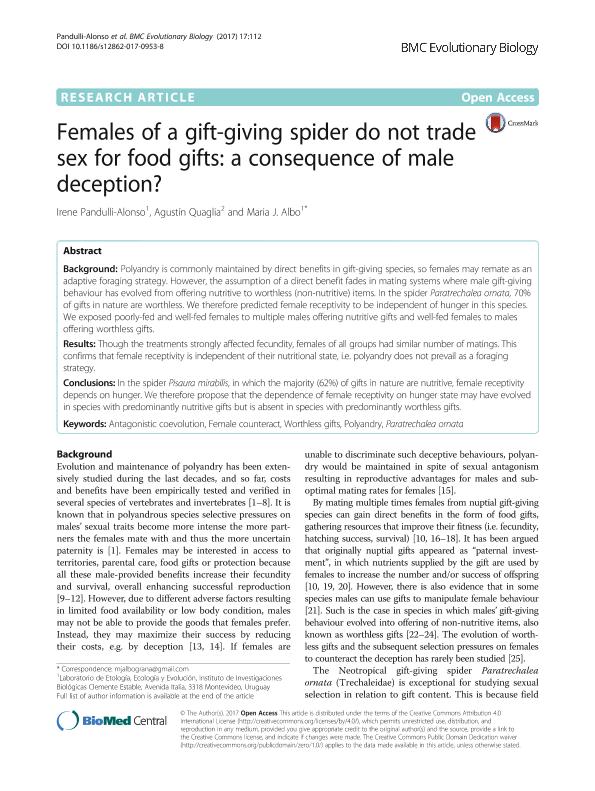Artículo
Females of a gift-giving spider do not trade sex for food gifts: a consequence of male deception?
Fecha de publicación:
05/2017
Editorial:
Biomed Central
Revista:
Bmc Evolutionary Biology
ISSN:
1471-2148
Idioma:
Inglés
Tipo de recurso:
Artículo publicado
Clasificación temática:
Resumen
Polyandry is commonly maintained by direct benefits in gift-giving species, so females may remate as an adaptive foraging strategy. However, the assumption of a direct benefit fades in mating systems where male gift-giving behaviour has evolved from offering nutritive to worthless (non-nutritive) items. In the spider Paratrechalea ornata, 70% of gifts in nature are worthless. We therefore predicted female receptivity to be independent of hunger in this species. We exposed poorly-fed and well-fed females to multiple males offering nutritive gifts and well-fed females to males offering worthless gifts. Though the treatments strongly affected fecundity, females of all groups had similar number of matings. This confirms that female receptivity is independent of their nutritional state, i.e. polyandry does not prevail as a foraging strategy.ConclusionsIn the spider Pisaura mirabilis, in which the majority (62%) of gifts in nature are nutritive, female receptivity depends on hunger. We therefore propose that the dependence of female receptivity on hunger state may have evolved in species with predominantly nutritive gifts but is absent in species with predominantly worthless gifts.
Palabras clave:
Coevolucion Antagonista
,
Falsa Recompensa
,
Poliandria
,
Paratrechalea Ornata
Archivos asociados
Licencia
Identificadores
Colecciones
Articulos(SEDE CENTRAL)
Articulos de SEDE CENTRAL
Articulos de SEDE CENTRAL
Citación
Pandulli Alonso, Irene; Quaglia, Agustín Ignacio Eugenio; Albo, Maria J.; Females of a gift-giving spider do not trade sex for food gifts: a consequence of male deception?; Biomed Central; Bmc Evolutionary Biology; 17; 1; 5-2017
Compartir
Altmétricas




